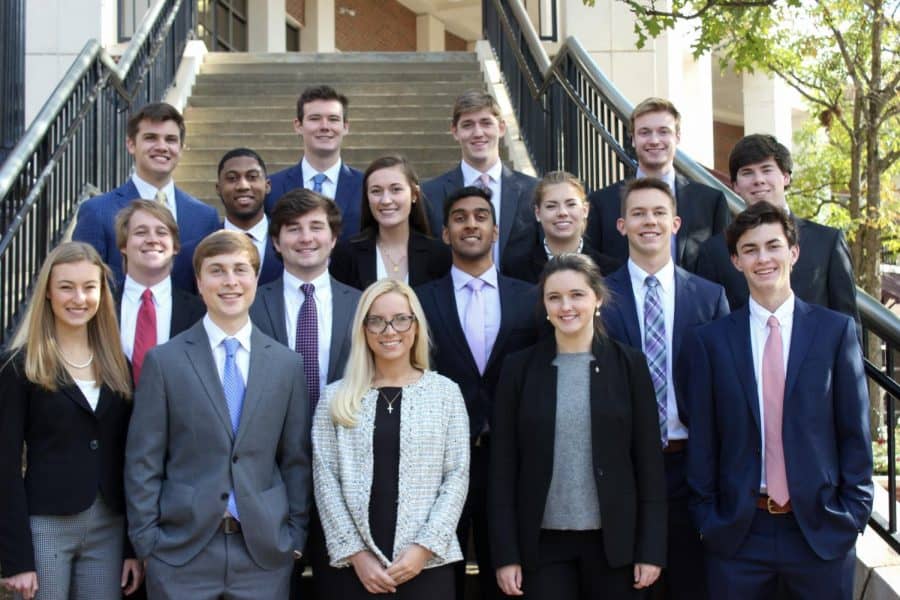Forza Financial invests within community
January 31, 2019
In 2010, UA students visited the Alabama Black Belt region and decided to start a company that would begin to curb the massive financial inequality in developing areas.
Forza Financial, a student-run nonprofit company registered as a 501(c)3 in Alabama, specializes in microinvesting – specifically loans from $500-$5,000 with low interest rates. The company currently has around 20 employees with experience in many areas of business, and while Forza originally provided only investing services, it has recently changed its business model.
Forza found a need for its services in the wake of the stock market crash in 2008 and the 2011 Tuscaloosa tornadoes, and while it thrived in those original conditions, the economy around it transformed. The company, since 2016, has had to re-examine its identity.
Former Forza Financial CEO Jon Hanley said microinvesting was first made popular in Bangladesh by entrepreneur and businessman Muhammed Yunus, who would give small amounts of money to trustworthy people and reliably have it paid back. It became a worldwide phenomenon because of its success in boosting the economies of impoverished areas.
Forza began in Tuscaloosa when it was similar to one of these places, and it flourished in that environment. It gave out multiple successful loans to existing businesses that needed help getting back on their feet.
Microinvesting, as opposed to massive amounts of loans approved or disapproved by large banks, is an interpersonal business.
“You have to base it off of character, and rather than on past, I guess, financial patterns on future financial patterns,” said Hanley, a senior majoring in marketing and history.
Forza asks its clients questions about what happened in a person’s history to explain his or her poor credit or financial mistakes, which allows for greater potential in investing because Forza does not deny people who have promise, but poor credit. This model is also necessary for microinvesting because many people have bad credit scores and financial records due to misunderstandings with banking companies.
“Many people in this area feel as if they’ve been taken advantage by, or are not comfortable with, financial institutions, making them hesitant to seek loans from someone they never worked with before,” Hanley said.
Hanley understood that many people have been abused by banks’ policies on loans or not understood them. In order to take advantage of loans again, these people needed a personal connection to the source of their loan.
The Tuscaloosa economy in 2011, after the tornadoes, also created an environment in which there were many existing businesses that just needed a small boost to get running again. Companies needed a large piece of equipment replaced that was damaged in the storm, after which they could resume function and easily repay the loan.
“There were a lot of established businesses who said ‘I just need five grand,’” Hanley said.
When Tuscaloosa healed, however, the market for small loans changed. After the existing businesses got up and running, all the people looking for a loan were looking for one so that they could start a business, which bore little promise of returns.
Forza was used to years of successful microinvesting with reliable return on its loans, and it was with this momentum that it formed an identity that was hard to break from. Hanley said this contributed to the feeling that in order to be effective in its goal of growing the Tuscaloosa community, Forza needed to be giving out loans.
So in 2014 and 2015, Hanley said the company gave out a slew of bad loans.
“They got less and less loan applications, so they started lowering their standards,” Hanley said. “The year before I came, they gave out five loans, and they were bad choices.”
Hanley said Forza never saw its money back.
Hanley became CEO in May 2018, and it was clear to him that for the company to stay alive and remain effective, it would have to change its model.
“Me and some younger people started pushing a new direction,” Hanley said. “Consulting seemed like an obvious solution. What I always thought was, there are more ways to help people than just giving them money.”
Hanley had to show company members that Forza had more to offer to people than a $5,000 loan. Soon after, the company held a meeting to discover who had specific skills to offer in the new consulting model. They realized there were people who were good with accounting, graphic design, social media marketing and many other skills. They began to realize these talents could be utilized to accomplish the company’s ends.
One of Forza’s most recent clients is La’Shun Wallace. His experience in event organization and with young, unsigned rappers inspired him to start his own record label. He had all the money he needed to start the company, but he needed advice on how to market, how to legally structure his company and how to create the infrastructure that would get his artists’ recordings to all the essential music-streaming sites. Forza was able to provide.
Conor Lazarus, a sophomore majoring in finance and economics with a concentration in actuarial sciences, said working with Forza could help him professionally by giving him experience with clients.
“I think working with Forza would make me more valuable in my field by giving me experience in drafting business plans and building interpersonal relationships with clients,” Lazarus said.
Loans are still a part of the company. If Forza believes a client could benefit from it and will be able to pay it back, they will give one out. Now, however, loans are a non-essential aspect of the company. Kevin Mullally, assistant professor of economics, finance and legal studies and faculty advisor for Forza, said he is still not sure how he feels about the direction Forza is going in, but it has promise.
“I think in terms of the students’ skill set and their ability to actually make an impact, it sounds like they’ve found a better direction than trying to get loans and having to follow up on those loans and all that kind of stuff,” Mullally said.
Forza is currently being as selective as ever with its hiring process, with 20 current employees as opposed to its former 40.
“Right now, I think the size is good,” Hanley said. “Finding more students that want to join has never been a problem. We worked really hard to get less people on. We had 120 people applying, and it took us four weeks to go through that.”
Forza is currently continuing with the new model of business and helping the community in Tuscaloosa more than it has been able to before. Hanley is graduating in May and was replaced by Lucy Thomas, a junior majoring in finance, economics and mathematics, this January.
Mullally said the experience of working with Forza is different than the experience of an internship.
“With Forza, the skills that you guys are getting are some problem solving, some creativity, the ability to innovate,” said Mullally. “It has potential to be more valuable, or certainly valuable in a different way, than a traditional business internship.”










